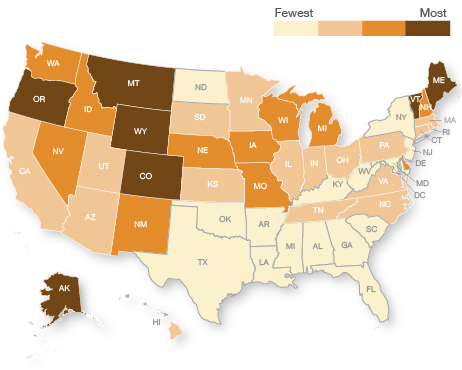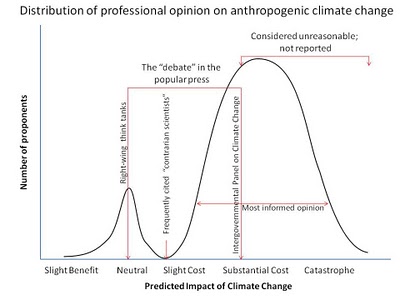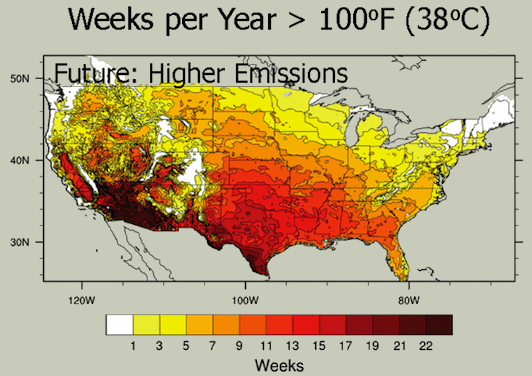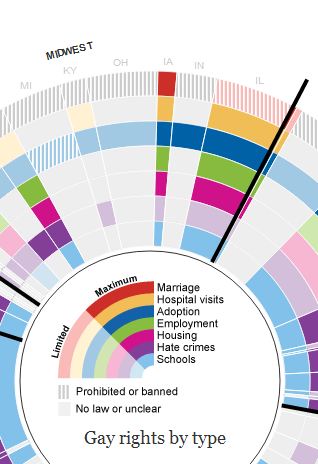Two unrelated but interesting items. First, Walter Russel Meade rings down the curtain on OWS:
To some degree, it was killed by its “friends.” The tiny left wing groups that exist in the country jumped all over the movement; between them and the deranged and occasionally dangerous homeless people and other rootless wanderers drawn to the movement’s increasingly disorderly campsites, OWS looked and sounded less and less like anything the 99 percent want anything to do with. At the same time, the movement largely failed to connect with the African American and Hispanic churchgoers who would have to be the base for any serious grass roots urban political mobilization. The trade unions picked up the movement briefly but dropped it like a hot brick as they found the brand less and less attractive.
It is as if the Tea Party had been taken over by the Aryan Brotherhood and delusional vagrants while failing to connect with either evangelical Christians or respectable libertarians. The MSM at one point was visibly hungering and thirsting for exactly that fate of marginalization to happen to the Tea Party, and the MSM did its klutzy best to tar the Tea Party with that kind of Mad Hatter extremism. The Tea Partiers by and large (not always or cleanly) escaped the fatal embrace of the nutters and the ranters on their side of the spectrum; OWS was occupied by its own fringe, and so died.
On a happier note, NPR had a quick hit on craft brewing:
Beer production has been flat in the U.S. for decades — it's actually a tiny bit lower than it was 30 years ago (find a comprehensive data set here). And the number of big breweries has gone down.
But over the same time, the number of small, independent breweries in America has exploded. ... Craft breweries account for more than 95 percent of the breweries in America, but they make just 6 percent of the beer.
And here's a map of craft breweries per capita by state:

I agree with Jeff Atwood that learning to code isn't really a good goal:
The "everyone should learn to code" movement isn't just wrong because it falsely equates coding with essential life skills like reading, writing, and math. I wish. It is wrong in so many other ways.
- It assumes that more code in the world is an inherently desirable thing. In my thirty year career as a programmer, I have found this … not to be the case. Should you learn to write code? No, I can't get behind that. You should be learning to write as little code as possible. Ideally none.
-
It assumes that coding is the goal. Software developers tend to be software addicts who think their job is to write code. But it's not. Their job is to solve problems. Don't celebrate the creation of code, celebrate the creation of solutions. We have way too many coders addicted to doing just one more line of code already.
He concludes:
Please don't advocate learning to code just for the sake of learning how to code. Or worse, because of the fat paychecks. Instead, I humbly suggest that we spend our time learning how to …
- Research voraciously, and understand how the things around us work at a basic level.
- Communicate effectively with other human beings.
These are skills that extend far beyond mere coding and will help you in every aspect of your life.
We can't hear this enough. It's why I tend to hire liberal arts majors who can code rather than computer science majors who can read.
For the last day or so, Chicago has had record-low humidity of all things, with dewpoints below 0°C for much of it:
This is the third day this year and only the 19th day in 142 years dating back to 1871 that the city has officially logged a relative humidity below 20%. At Midway Airport the relative humidity also dropped to 17 percent at 5pm.
This is the lowest relative humidity recorded in Chicago in more than six years since another 17 percent humidity was logged on February 20, 2006.
The other two low humidity days this year were back on April 8 and 9 when the relative humidity dropped to 19%.
Right now the dewpoint of 2°C on a temperature of
26°C gives us a relative humidity around 21%. For comparison, though, in Las Vegas the humidity is about 3%, so we're really not that dry here.
Via Sullivan, a suggestion from Dan McAdams about the difficulties some people have accepting natural selection theory:
A story is a narrative account of a motivated character who acts to achieve certain goals or ends over time. Every great story you can think of—from Homer’s Iliad to your favorite television show—involves characters who pursue goals over time, characters who want something and set out to achieve it. In this sense, the classic biblical creation stories are very good stories. You have a main character—God, the creator—who sets out to achieve something over time. There is purpose and design to what God, the main character, does. God is an agent—a self-conscious, motivated actor. All stories have agents.
Evolutionary theory, however, is not a story in that there is no prime agent, no self-conscious and motivated main character who strives to achieve something over time. For this reason, there is no overall narrative arc or design, no purpose that is being achieved by a purposeful agent. Instead, you have random, mechanical forces—variation, selection, and heredity. Bad story! But, at the same time, extraordinarily brilliant and elegant theory, for it provides a compelling and scientifically testable explanation for life on earth.
This dovetails well with a book I read two weeks ago, Chris Mooney's The Republican Brain. Mooney doesn't suggest that people who deny the obvious—like evolution or climate change—are stupid; rather, they have compelling psychological and historical reasons for believing what people like them tell them. Mooney makes it clear that we need better stories, better narratives, to help people understand and accept the counter-intuitive ways the world actually works. But McAdams has a point: some people need narratives, and narratives need actors. Natural selection works without any conscious intervention. Climate change happens because of billions of diverse actors.
Pointing out how people have got things wrong doesn't work. We need to speak the same language.
Or, as Krugman puts it, Eurodämmerung:
Some of us have been talking it over, and here’s what we think the end game looks like:
1. Greek euro exit, very possibly next month.
...
4b. End of the euro.
And we’re talking about months, not years, for this to play out.
Good thing I only have about €15 in cash. Though I do have some escudos and pesetas somewhere...
It looks like we're not hearing the truth about anthropogenic climate change. Who's keeping the lid on the data? Climate scientists:
Climate scientists have been consistently downplaying and underestimating the risks for three main reasons. First, their models tended to ignore the myriad amplifying carbon cycle feedbacks that we now know are kicking in (such as the defrosting tundra).
Second, they never imagined that the nations of the world would completely ignored their warnings, that we would knowingly choose catastrophe. So until recently they hardly ever seriously considered or modeled the do-nothing scenario, which is a tripling (820 ppm) or quadrupling (1100 ppm) of preindustrial levels of carbon dioxide over the next hundred years or so. In the last 2 or 3 years, however, the literature in this area has exploded and the picture it paints is not pretty (see “An Illustrated Guide to the Science of Global Warming Impacts: How We Know Inaction Is the Gravest Threat Humanity Faces").
Third, as Blakemore (and others) have noted, the overwhelming majority of climate scientists are generally reticent and cautious in stating results — all the more so in this case out of the mistaken fear that an accurate diagnosis would somehow make action less likely. Yes, it’d be like a doctor telling a two-pack-a-day patient with early-stage emphysema that their cough is really not that big a deal, but would they please quit smoking anyway. We live in a world, however, where anyone who tries to explain what the science suggests is likely to happen if we keep doing nothing is attacked as an alarmist by conservatives, disinformers, and their enablers in the media.

The post goes on to outline how much fun life will be in 80 years when, if we do nothing, global temperatures will be 5–7°C warmer than now. A related article goes into more depth, and includes this chart of what summers might be like:

I'll wrap up by linking to yesterday's Science Friday, which discussed the appalling lack of scientific literacy in government. And the band played on...
Leave it to a British newspaper to create such a clear diagram of states' policies:

On the same subject, Illinois Governor Pat Quinn today promised to pass a gay-marriage law...someday:
Supporters of the gay marriage bill pending in the Illinois House aren't likely to call it for a vote before lawmakers are scheduled to go home May 31.
"I think we have a few other things on our plate, like pensions, health care, Medicaid, public safety, education, the state budget, and I think that's going to take all of our time and attention," said sponsoring Rep. Greg Harris, D-Chicago.
Rick Garcia, director of the Equal Marriage Illinois project at The Civil Rights Agenda, put it more succinctly: "There has been a same-sex marriage bill out there since maybe 2006 in Springfield, and it's going nowhere fast."
If a vote were to happen, it likely wouldn't come until after the Nov. 6 election. The House and Senate will have a number of lame-duck lawmakers who are either retiring or lost re-election bids. They're more free to vote their conscience even if it diverges from the views of the people who elected them.
Oh, well. At least we have civil unions here.
And the office dog is doing what he does best:
